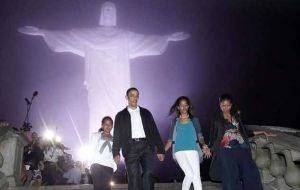MercoPress. South Atlantic News Agency
Obama says Brazil’s transition to democracy an example for the Arab world
 The First Family at the foot of Christ the Redeemer in Rio (Photo AP)
The First Family at the foot of Christ the Redeemer in Rio (Photo AP) President Barack Obama, declaring support for Brazil’s rising global economic clout, said the country’s transition from dictatorship to democracy can serve as a model for pro-democracy movements around the world, including in North Africa and the Middle East.
Brazil is “a country that shows democracy delivers both freedom and opportunity to its people,” Obama told a crowd on Sunday at Rio de Janeiro’s century-old Theatro Municipal. “A country that shows how a call for change that starts in the streets can transform a city, transform a country, transform a world.”
Obama arrived in Brazil March 19 to kick off a five- day tour of Latin America the same day that an international coalition began military action against forces loyal to Libya’s leader Muammar Gaddafi. As Obama spoke in Rio, the military operation escalated with anti- aircraft fire heard in the Libyan capital of Tripoli.
The crisis in North Africa has overshadowed Obama’s trip, as he’s had to juggle demands including national security briefings with official events and sightseeing. A planned press conference with President Dilma Rousseff was scrapped, allowing the two leaders to avoid questions about Brazil’s abstention in the United Nations Security Council vote last week authorizing air strikes against Libya.
Even so Obama used Sunday’s speech to compare the development of free markets in Brazil since the end of the country’s last dictatorship in 1985 to the wave of democratic uprisings across the Middle East and North Africa.
“As two nations who have struggled over many generations to perfect our own democracies, the United States and Brazil know that the future of the Arab world will be determined by its people” Obama said.
After spending his first day in Brasilia discussing trade and economic relations with Brazil’s first female president and a group of business executives, Sunday’s speech was meant to deliver a broader message to the Brazilian people that underscored shared values between the two countries.
“For so long, you were called a country of the future, told to wait for a better day that was always just around the corner,” Obama said. “Meus amigos, that day has finally come. And this is a country of the future no more. The people of Brazil should know the future has arrived. It is here now.”
Earlier in the day, Obama and his wife, Michelle, and their daughters Malia and Sasha visited a favela, shantytown. Arriving in the City of God favela, the first family took in a performance of capoeira, an Afro-Brazilian martial art, and afterwards kicked around a soccer ball, with Obama noting that Brazilians are the “best soccer players in the world.”
Later they visited the city’s iconic Christ the Redeemer statue.
Obama’s tour continues Monday in Chile, where he’ll meet with President Sebastian Piñera before heading Tuesday to El Salvador en route to Washington March 23.
Chile was the first nation in South America to sign a free trade agreement with the U.S., in 2003. Since then, as in Brazil and other parts of South America, China has been making inroads. China’s demand for copper allowed it to surpass the US to become the country’s biggest export market in 2007. Chile is the world’s biggest producer of the metal.




Top Comments
Disclaimer & comment rules-

-

-

Read all commentsBrasil would be model for N.Africa,Middle East ?
Mar 21st, 2011 - 10:15 am 0why not !
If Arab countries produce and sell vast grain-food, iron-steel,
automobil,plane..etc then could take Brasil model .
beyond ignorance !
Perhaps Obama once again puts his foot in it.
Mar 21st, 2011 - 02:27 pm 0Brasil’s military period arose for unique reasons: high inflation, economic stagnation, and the increasing influence of radical political elements – reasons uniquely different in breadth and depth from the unique reasons of each of the arab states (presently) under ‘dictatorship’.
Mar 21st, 2011 - 04:08 pm 0Brasil's ruling sequence of Generals gradually ran out of steam and ran out of ideas – their background militated against the skills-set needed for managing a developing, heterogeneous sub-continental country.
Gen. Joao Baptista de Oliveira Figueiredo (1979-85), the last of the military leaders of the period of military control of Brasil, permitted the return of politicians exiled or banned from political activity during the 1960s and 1970s and allowed them to run for state and federal offices in 1982.
The transition was as gentle as ever likely, and the amnesty allowed the country to look forward, albeit with backward glances questioning reconciliation.
Luckily, the end of South African apartheid enabled Mandela to set the standard for humanity in these matters (1995-) and, though Dilma would like a one-sided removal of the old amnesty, she is now judged against this higher Mandela-standard.
“As two nations who have struggled over many generations to perfect our own democracies, the United States and Brazil know that the future of the Arab world will be determined by its people” Obama said.
OK, perhaps, but a powerful demagogue/dictator, with control of his army – and who is prepared to use it on his people, frequently takes some shifting.
This was not the Brasilian experience and, luckily, statesmen(-academics) of the standing of FHC/Serra were around to carve out a new political philosophy of governance, social evolution and outward-looking economic development.
So, President Obama – 9/10 for rhetoric; 5/10 for accuracy.
Commenting for this story is now closed.
If you have a Facebook account, become a fan and comment on our Facebook Page!